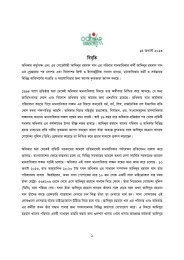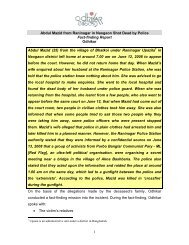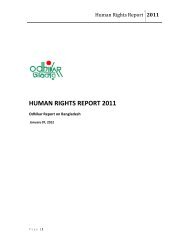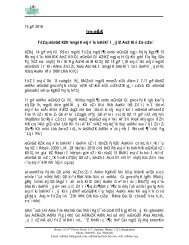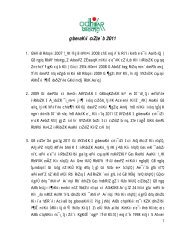Please - Odhikar
Please - Odhikar
Please - Odhikar
Create successful ePaper yourself
Turn your PDF publications into a flip-book with our unique Google optimized e-Paper software.
violations suffered by thousands of people in two southern insurrections, that lasted between<br />
1987-1990.<br />
Since 1977, neo-liberal and capitalist economic policies have also brought about large-scale<br />
violations of economic, social and cultural rights. Many business enterprises, transnational<br />
corporations and law enforcement authorities are behind such violations. Since about three years<br />
ago, religious tensions have also escalated, resulting in the burning of places of worship and<br />
attempts to restrict freedom of religion through legislature. In the past few years, a High Court<br />
Judge has been killed; staff from the Attorney General's office and National Human Rights<br />
Commission have been harassed and threatened. Lawyers, media personalities and human rights<br />
defenders have also been threatened. In this scenario, how can victims and witnesses- often<br />
ordinary, poor people be assured that know they and their loved ones will be safe?<br />
I would just like to present two case studies here of Mr. Gerald Pereira and Mr. Michael<br />
Anthony Fernando. Police tortured Gerald Pereira in 2002. In 2003, the Sri Lankan Supreme<br />
Court awarded him record damages for this violation of his rights and integrity. On 21st Nov.<br />
2004, Mr. Pereira was shot on his way to work, and died three days later. He was due to testify in<br />
a criminal case against the afore-mentioned policemen on 2nd Dec. 2004.<br />
Mr. Fernando has filed several cases of human rights violations by several prison guards who<br />
had tortured him, while he was in custody after being sentenced to a term of one years<br />
imprisonment on the basis of alleged contempt of court in a highly criticized judgment. After<br />
serving his time in prison, he had received several death threats about which he complained to<br />
the local authorities as well as to the UN Human Rights Committee. On 9 January 2004, the UN<br />
Human Rights Committee, in pursuant of Rule 86 of the Committee's Rules of Procedure, made<br />
a request to the Sri Lankan government to adopt all necessary measures to protect the life, safety<br />
and personal integrity of the author and his family members, so as to avoid irreparable damage<br />
to them. [Untied Nations High Commission for Human Rights Reference: G/SO 215/51 SRI (7)]<br />
However, there was no response from authorities. In February 2004, there were attempts on his<br />
life. Mr. Fernando subsequently left the country, in view of the inability and unwillingness of<br />
authorities to guarantee his security.<br />
Some key issues can be highlighted from these case studies:<br />
� Victims are often threatened-during trial, before trials and even after. Even when the matter<br />
is such that the Attorney General files cases!<br />
� Multiple and continuing victimization-as evident in the above case studies, most victims<br />
end up being continuously victimized-being threatened, abused over and over again.<br />
� In many cases, threats to victims and witnesses target family members- and in many cases,<br />
the lives of family members, including children, are affected by threats, intimidation and<br />
harassment on victims and witnesses.<br />
� Victims and Witnesses are often forced to rely on protection from the perpetrators of human<br />
rights violations. In many instances, perpetrators of human rights violations continue to serve in<br />
the respective areas.<br />
78<br />
Report 2005




